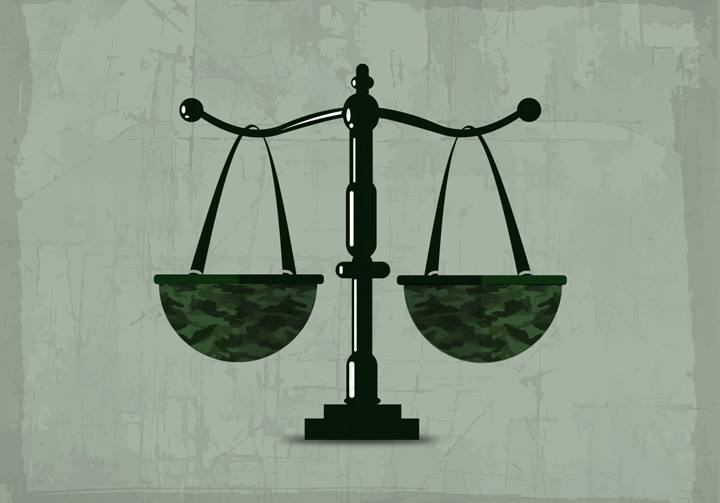Islamabad:
The Supreme Court Justice Jamal Khan Mandokhail and Naeem Akhtar Afghan on Friday released a disagreement in the case of the lawsuit against civilians in military courts in which he declared such court orders constitutionally.
The 35-page minority decision states that the court of court orders was only limited to military staff and cannot be extended to ordinary civilians.
The judges determined that the use of military jurisdiction to civilians was constitutional.
The disagreement noted critically examines the broader assumption that civilian courts are unable to handle high -profile cases, which suggests that this tale was misleading.
It notes that it has generally been portrayed that civilian courts have not handled serious offenses such as terrorism and that military courts are the only remedy, but reality is quite the opposite.
The judges remembered the precedent of the past, the judges noted that military courts were temporarily empowered in 2015 to hear certain terror -related cases. However, the experiment failed to eliminate terrorism, partly because military officers lack the legal experience required to judge complex criminal affairs.
The decision notes that terror crews are not being prosecuted globally by military courts. It claims that criticism of the criminal justice system is incorrectly placed and notes that civilian courts are often due to poor investigation, weak witnesses or politically accused cases, not from legal competence.
It pointed out that all citizens under Article 25 of the Constitution are the same for the law and are entitled to equal protection of the law. The principle of equal protection ensures that all citizens are treated equally under the law, regardless of their background, race, religion, political affiliation, action or other classifications.
“This is a fundamental rather guaranteed by the Constitution that ensures that the law applies equal and no one is above the law. Treatment of citizens differently without a reasonable classification amount for discrimination.”
“This happens when two equally placed persons or groups of people are treated differently. Discriminating persons in litigation due to their actions or offense is a violation of the principle of corpse of the law and is entitled to equal law protection,” it further noted.
“A person’s safety and freedom is a fundamental right to be free from arbitrary deprivation of life and freedom. Article 9 of the Constitution guarantees and ensures that citizens have the right to protect injury, physical danger, potential risks and threats to their lives, unfair or illegal detention or imprisonment and for any act that can remove their freedom or life, in any case,” the noticing note.
It also noted that an independent judiciary can serve as a control of the government’s power to ensure the security of citizens and the freedom of citizens. The criminal system involves a set of laws and principles that provide a procedure, aims to protect citizens’ ife and freedom and to ensure order in society.
Article 10 of the Constitution ensures protective measures in terms of arrest and detention of a person with the right to consult and be defended by a legally practicing of their choice. It is also ensured that no persons are detained in custody beyond a period of 24 hours without authority by a magistrate.
“The Martial Courts, which were established under MJS, consisting of performers are not independent and impartial. They do not provide constitutional protection of life’s safety and freedom for a person, and the protection of his arrest and detention. While detained in military custody, the provisions of prison manual are not applicable to the persons accused of military crime.
It also noted that the defendant to consult and be defended by a legally practicing of his own choice, guaranteed by the Constitution, was subject to the approval of the chief of the chief of the army staff or the call manager, as provided by Rule 82 of the Pakistan Army Act, rules 1954.
“This is a fundamental right for a person under the sub -article (1) of Article 10 of the Constitution, which cannot be made conditional. Detention of accused of offense under the clause (d) and the procedure passed by the courts Martial, is in violation of, removing and Abridge their fundamental rights, which are in violation of articles 9 and 10 in the Agreement.”
The memo stated that the right to fair trial and proper process is universally accepted as a fundamental right, therefore the legislature that realizes its importance and necessity, deployed Article 10a of Chapter 1 of Part II of the Constitution, by the Constitution (eighteenth amendment), 2010.
“Fair trial and proper process help to limit abuse of governments and state authorities and ensure integrity and justice in the legal system. Due proper process has a requirement that the legal issue relating to civil rights and obligations and a criminal case against a citizen is resolved in accordance with legislation, established rules and principles on the basis of evidence.”
The dissent also criticizes both the federal and provincial governments in which they said that instead of investing in and improving the civil justice system, they chose the lawsuits for civilians, a step that exceeds constitutional boundaries.
The judges observed that penalties handed to civilians involved in May 9, 2023 were events of military courts outside their jurisdiction and therefore invalid.
The note concludes by repeating that the delivery of justice is falling within the constitutional domain of the civil judgment.
The rule of law requires every citizen to be entitled to a fair trial, the decision states.



